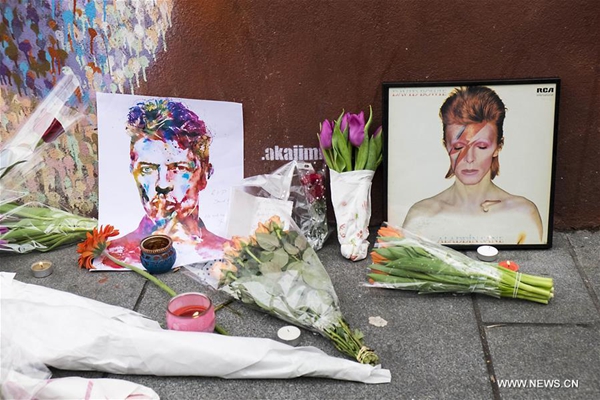The artist of the space age
- By Heiko Khoo
 0 Comment(s)
0 Comment(s) Print
Print E-mail China.org.cn, January 12, 2016
E-mail China.org.cn, January 12, 2016
|
|
|
Fans pay their respects with flowers and messages at a David Bowie mural in Brixton, South London, Britain, on Jan. 11, 2016. David Bowie, the iconic British singer-songwriter died on Sunday, just two days after his 69th birthday, his family announced Monday in a brief statement. [Xinhua/Ray Tang] |
David Bowie (1947-2016) was the world's most creative popular artist-musician in the last 50 years. He was born as David Jones to a working class family in Brixton, London. The destruction caused by wartime bombing scarred his early visual environment. His family moved to Bromley, near London, where he attended an arts-focused school. He finished at 16 with only one qualification - art.
He discovered the impact of music at an early age and it became the central medium to express his drives. His first musical success came in 1969 with the song Space Oddity. It was released just days before Apollo 11 transported the first man to the Moon - Neil Armstrong. At the time I was 5 years old but I clearly remember my father waking the whole family in the early hours to watch Armstrong take this "giant step for mankind."
Bowie's song became the anthem of the space age. It blends science with bravery and melancholy to capture the hopes and fears of an era. Its words record a fictional cosmonaut called Major Tom through his radio communication with Ground Control. It still sounds like a siren call from the future and the past. Technology and machines control Tom's fate. He looks down on the beauty of planet earth but seeing it from outside evokes melancholy for the past. As he embarks on his heroic, dangerous and selfless mission on behalf of humanity his isolation evokes declarations of love for his wife that are both desperate and hopeless.
By the 1960s the technical, scientific and social advances in the Soviet Union included launching the first satellite and sending the first man into space. Soviet economic planners promised to overtake the West and to create a socialist heaven on earth by 1980. Everyone would live in plenty; they would work less than 30 hours a week; and most goods and services would be free on demand. Therefore, landing a man on the moon symbolized the revival of self-confidence in the United States, capitalism and its mission.
The long economic boom of the 50s and 60s generated a confident youth prepared to challenge the dominant norms, constraints and traditions. Bowie worked with multi-disciplinary Arts Labs to generate new cultural and artistic combinations. Popular culture became widely associated with political protest against the Vietnam War and social, cultural, racial and sexual mores of the past were all jettisoned: as peace, love and rebellion became the inspiration and watchwords of the young. From this time onwards Bowie was at the cutting edge of technical and artistic creativity mainly expressed in music and through his changing persona.







Go to Forum >>0 Comment(s)